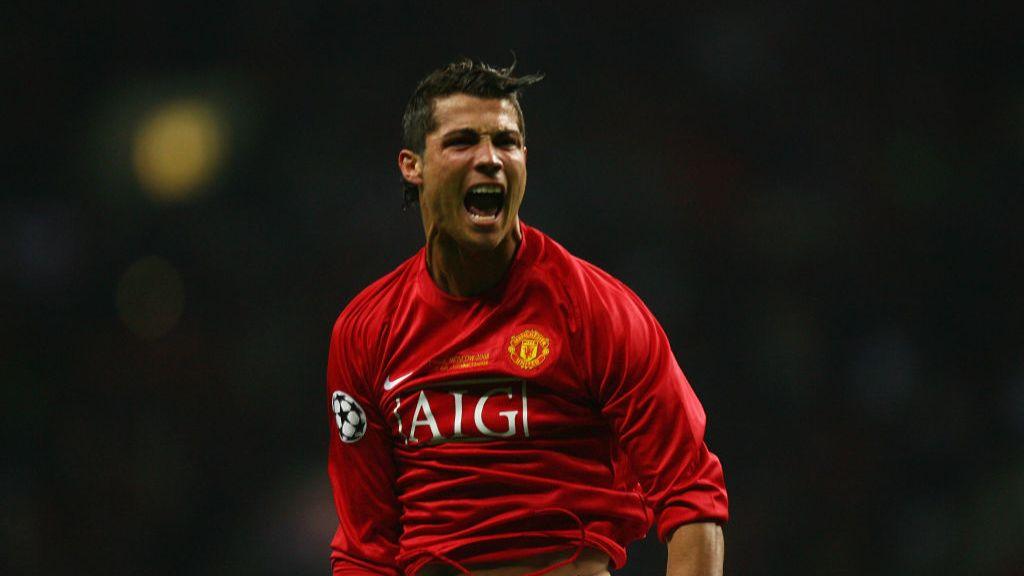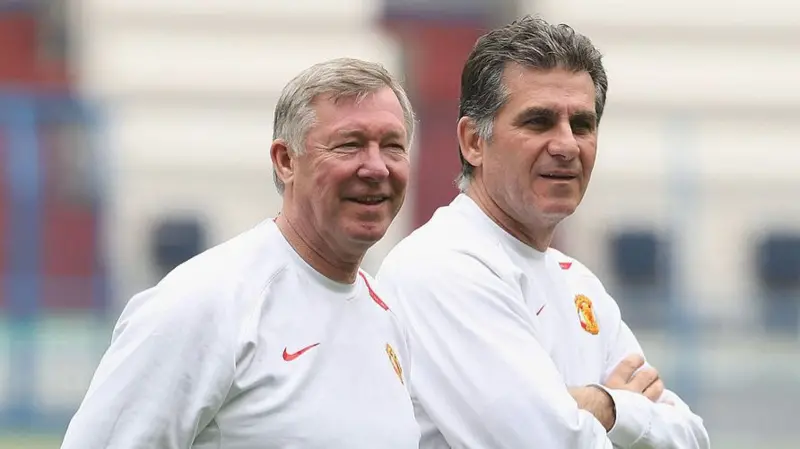This is a tale of two sets of tears.
The first moment unfolds under the intense glare of the global spotlight—in Moscow’s Luzhniki Stadium in 2008.
Millions watch as a torrential downpour sets the stage for a British manager to cement his legendary status, marked by a dramatic slip that would become iconic.
The second moment, three years earlier and 3,000 miles away, happens far from the public eye, behind the locked dressing room doors of Estadio do Benfica in Portugal.
The 2008 Champions League final between Chelsea and Manchester United is etched in football history, largely remembered for John Terry’s infamous missed penalty. The narrative frames it as the moment Chelsea’s talisman squandered a chance at glory.
But for Rio Ferdinand, former Manchester United and England stalwart, the seeds of triumph in Moscow were sown much earlier.
In the dry heat of a Portuguese evening, it was a young Cristiano Ronaldo, not Terry, who faced a transformative moment. Reduced to tears, Ronaldo endured the wrath of Sir Alex Ferguson’s infamous hairdryer—a moment Ferdinand believes was pivotal to the eventual victory in Russia.
Manchester United were in the early stages of a rebuilding phase.
After winning the Premier League in 2002-03, they failed to reclaim the title for the next three seasons, as Arsenal (2003-04) and Chelsea (2004-05 and 2005-06) dominated the league.
Sir Alex Ferguson, frustrated by the disruption of his dominance, decided enough was enough.
According to Rio Ferdinand, it was during this period that a pivotal moment unfolded—a moment that set off a chain reaction culminating in United’s Champions League triumph in Moscow.
“I remember Cristiano in tears in the changing room, and I thought, ‘This manager doesn’t care who you are,’” Ferdinand recalls in the BBC Sport documentary Sir Alex, set to air on iPlayer on Boxing Day.
United had traveled to Portugal for a few games, and a young Cristiano Ronaldo, eager to prove himself, struggled to make an impact.
“He hadn’t played well because he was trying too hard to impress,” Ferdinand explains. “Everyone was talking about him, and he was desperate to show why United had signed him. But it just wasn’t coming off.”
After a lackluster performance against Benfica, Ferguson unleashed his infamous temper on Ronaldo.
“‘Who do you think you are? Trying to prove yourself to everyone. Do you think you’re a superstar?'” Ferdinand recalls Ferguson saying.
The harsh words left Ronaldo in tears, but, as Ferdinand notes, it was exactly what the young winger needed.
“He deserved it,” Ferdinand says. “Look at the player he became. The manager knew when to be soft and kind, but he also knew when to be tough.
“To become the world’s best player, Cristiano needed moments like that.”

Sir Alex Ferguson thrived on big moments, and none defined his career more than the Champions League triumph in Moscow in 2008.
That 2008 team, perhaps even more than the legendary “Class of ’92” featuring David Beckham, Paul Scholes, Gary Neville, and others, solidified Ferguson’s legacy at Manchester United. They delivered his second Champions League title and may well have been the finest XI he assembled during his illustrious 26-year tenure at Old Trafford.
The construction of that last great United side—though the Robin van Persie-inspired squad that claimed his 13th Premier League title in 2012-13 also deserves a mention—was a masterclass in reinvention. It showcased Ferguson’s relentless pursuit of excellence, his ability to adapt, and the transformative impact of his not-so-quiet revolution, as players like Rio Ferdinand, Cristiano Ronaldo, and Wayne Rooney can attest.
In June 2004, Rio Ferdinand found himself in another Manchester United dressing room, listening to a speech that showcased yet another facet of Sir Alex Ferguson’s remarkable leadership.
This time, there were no tears, no infamous hairdryer treatment. Instead, Ferguson’s bullish determination took center stage, underpinned by an unshakable belief that he could rebuild United—even with the self-proclaimed “Special One,” José Mourinho, now at Chelsea.
“When Mourinho arrived in 2004, there were rumors about me and other players leaving,” Ferdinand recalls. “But Sir Alex told me, ‘We’re going to rebuild this team, and you’re a key part of it. Just trust me.’
“At that moment, he was probably the only manager in the world I’d have listened to like that. He said, ‘I don’t get things wrong when it comes to football. Stay with me, and we’ll get this right.’ And I believed him completely.”
Ferguson’s rebuild began decisively that summer with two pivotal additions. The first was Wayne Rooney, a once-in-a-generation English talent fresh off a breakout performance at Euro 2004. The 18-year-old forward’s arrival made headlines across the world, and his impact was immediate, both on the pitch and in the press.
The second addition was quieter but equally transformative: Carlos Queiroz returned to Old Trafford as Ferguson’s assistant manager after a brief spell at Real Madrid.
Mourinho’s arrival in the Premier League symbolized a broader shift—the growing internationalization of English football. Fueled by figures like Chelsea owner Roman Abramovich, this era saw an influx of foreign talent, rising transfer fees, and an increasing need for managers to adapt to the global game.
Rooney embodied the raw, English spirit—bold, relentless, and impactful. Queiroz, on the other hand, was the strategic mind Ferguson needed to bridge Manchester United’s traditional style with the nuances of European football. Fluent in multiple languages, Queiroz became a crucial intermediary for the increasingly cosmopolitan squad.
“Carlos was so smart,” Michael Carrick, another key Ferguson signing in 2006, reflects. “He led most of the training and tactical sessions. He was dry at times, but he was focused and brilliant at what he did. He complemented the boss perfectly.”
Ferguson’s vision for this rebuild was clear: prioritize speed and tactical flexibility, particularly in attack. Cristiano Ronaldo and Rooney became the cornerstone of this transformation, blending blistering pace with undeniable talent.
“Wayne and Cristiano had a massive impact,” Queiroz says. “They brought speed and unpredictability that forced opponents to react instantly. Those two kids changed the entire environment at the club.”
Their hunger and work ethic impressed even Ferguson. “We used to think we’d be the first ones at training,” Queiroz recalls, “but when Wayne and Cristiano joined, they were there before us.”
Beyond their on-field contributions, Queiroz’s influence extended to recruitment and strategy. Ferguson tasked him with bridging the gap between Premier League and European football.
“Sir Alex told me, ‘I need someone who understands European football, who can communicate with players from different cultures,’” Queiroz says. “At the time, English football was all about attack. But in Europe, it required patience, setting traps, and exploiting weaknesses.
“Our challenge was balancing the English style on the weekend and adapting to a completely different approach in Europe three days later. From the start, Sir Alex made it clear: ‘Carlos, you’re here to help me win another Champions League.’”
Step by step, Ferguson’s masterplan took shape, culminating in the unforgettable triumph in Moscow.
Wayne Rooney was central to Sir Alex Ferguson’s unrelenting pursuit of another Champions League title to bring back to Old Trafford. For Rooney, one of Ferguson’s greatest strengths was his ability to rebuild and adapt, constantly evolving the squad while maintaining success.
“I think what Sir Alex did was remarkable—he went through different phases with various teams and was able to rebuild the squad and take it in new directions,” Rooney reflects. “To do that and continue winning is an incredible achievement.”
Unlike Cristiano Ronaldo, who has openly spoken about the challenging relationship he had with his father, Rooney didn’t seek out a father figure in Ferguson. That said, Ferguson’s approach to man-management still had a profound impact on him.
“I didn’t need that father figure—I was close to home, with Liverpool just 30 minutes away,” Rooney explains. “I had my family and friends around me. But I’ve seen it with Cristiano and other players, how they need that kind of support a bit more.”
By the 2006-07 season, Ferguson’s rebuild was taking shape. With Rio Ferdinand and Nemanja Vidić solidifying the defense, Michael Carrick controlling the midfield, and Rooney, Ronaldo, and Carlos Tévez tearing up the forward line, United were starting to look unstoppable.
“We reached the Champions League semi-finals against Milan and won 3-2 in the first leg,” Rooney recalls. “They had such an incredible team—Kaka, Shevchenko, Pirlo, Seedorf, Maldini, Cafu. They were full of experience, and we were just beginning to find our feet.”
Though United lost 3-0 in the second leg and were eliminated, the defeat marked an important turning point. “After that first game, especially the win, we knew we were ready to compete,” Rooney adds.
The following summer, United reclaimed the Premier League title for the first time in four years. The journey toward Moscow was now well and truly underway.
